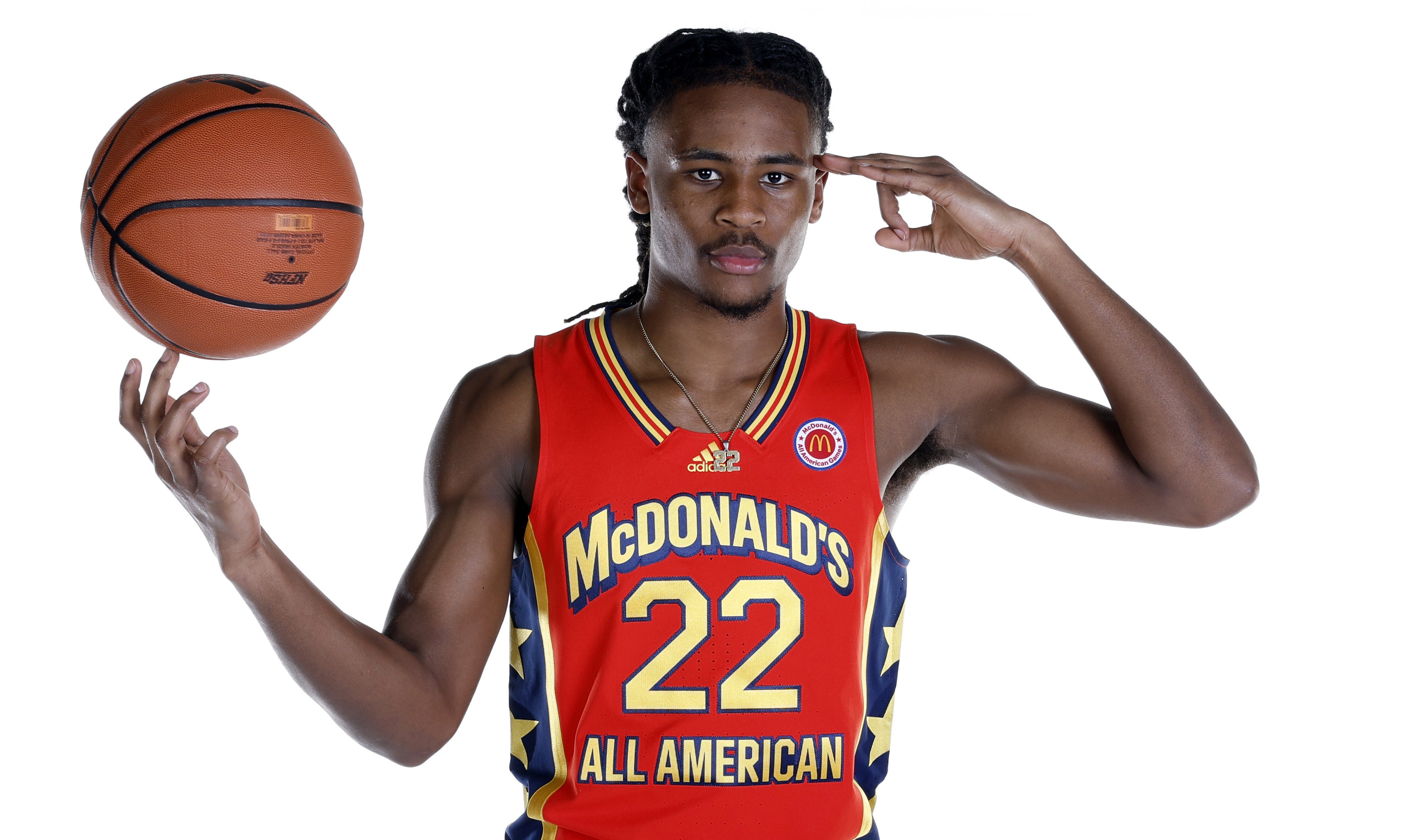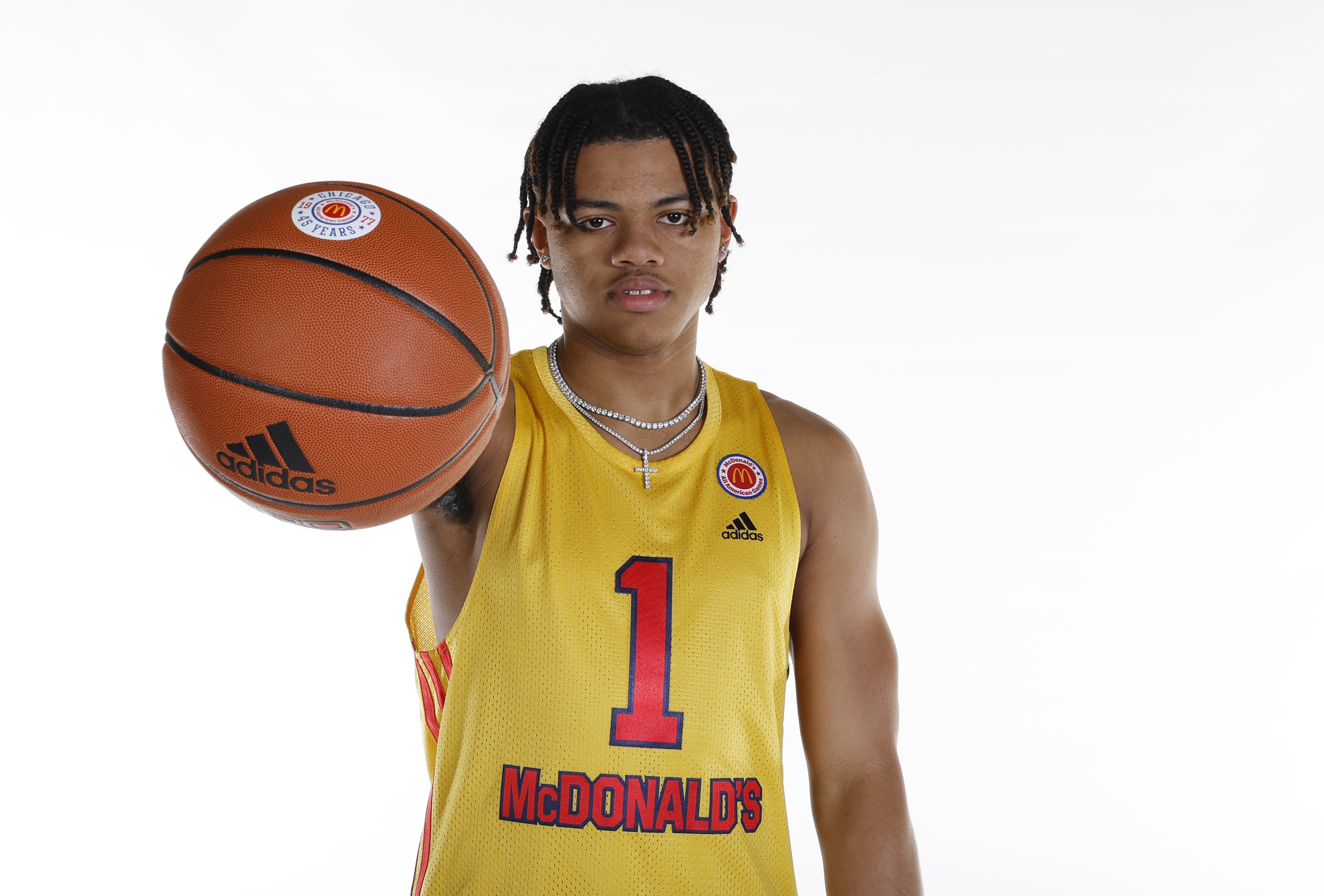New Mecca for Elite Basketball Prospects
Dallas might dominate the 2023 NBA draft — here's why it's the new hoops hotbed
Dallas is known for football.
The Cowboys are “America’s Team” and their star emblem — representing “The Lone Star State” — is among the most iconic logos in sports.
In 2004, I moved to Plano, a northern suburb of Dallas, and was in awe of the size of high school football stadiums. I learned quickly that the movie Friday Night Lights was in fact an accurate representation of high school football in Texas.
Dallas is less known for basketball, but that could be changing fast.
For one thing, the Dallas-Fort Worth Metroplex has a recent history of producing NBA players and prospects: 2021’s No. 1 overall pick Cade Cunningham is following in the footsteps of Olympic gold medalists Chris Bosh and Deron Williams; All-Stars Julius Randle, LaMarcus Aldridge, Kenyon Martin, Larry Johnson and Dennis Rodman; and many others. In addition to Cunningham, Tyrese Maxey and R.J. Hampton are recent first-round picks from the Dallas area that represent a new generation of talent coming from North Texas.
But there are clear signs that Dallas-Fort Worth is just getting warmed up. In fact, NBA teams might draft as many as ten — yes, TEN — players from the Dallas area next June.
First, the five freshmen: McDonald’s All-Americans Cason Wallace, Keyonte George, Anthony Black, and Jordan Walsh are projected first-round picks. Arterio Morris, an explosive combo guard who will play at the University of Texas, is the lone McDonald’s All-American from the 2022 high school class not on most preseason draft boards, but he could end up a top-60 prospect next spring.
Then there are the returning players. Two-time All-American big man Drew Timme opted to return for his senior season at Gonzaga and is arguably the best player — though not the best NBA prospect — in the nation. Timme will be looking to cap off his impressive college career with a national championship while showing NBA scouts he can space the floor with an improved jumper.
Harrison Ingram and Marcus Sasser are two of the top 40 players in college basketball and candidates to go in the first round. Kansas’ Jalen Wilson, fresh off a national championship, and TCU’s Mike Miles are also strong candidates to be drafted next June.
So while New York City has a claim as basketball’s historical mecca, going back to early in the 20th century, and other cities — Los Angeles, Chicago, Seattle and others — have staked their claims in more recent years, it’s time to wonder if Dallas-Fort Worth is next up.
To get a better look at the emergence of the Dallas area as a hotbed for basketball talent, I talked to seven people with expertise on the local scene: coaches, program directors, trainers and an NBA agent. In particular, I wanted to know the factors that helped answer one big question:
Why is Dallas such a hot spot for elite basketball talent?
1. TRACK RECORD
Derrick Shelby, co-founder of The Circuit and The Season Ticket:
The city of Dallas has been good for a while now. We have had guys from Chris Bosh to Julius Randle and Marcus Smart and several more big-time players. I think it’s a combination of things that has really helped the players in this city.
Brandon Espinosa, men’s basketball coach at Paul Quinn College and director of Head Coach Drive Nation:
The kids have seen what players before them can do, whether it's in college or the NBA. You can go back as far as Deron Williams, Bracey Wright and Chris Bosh. So they have a blueprint, they’ve seen these guys become McDonald’s All-Americans and they’ve seen what they’ve done in the pros, so it’s become more of a reality.
NBA agent:
It’s a major city with a huge population of kids playing basketball. You have a lot more kids who have switched over to basketball in what is considered a football city.
2. TRAINING
Espinosa:
We have elite-level trainers that these guys can get in touch with and get in the gym whenever they want. You look at what [professional trainer] Tyler Relph has done — he’s built his own facility that’s like a factory.
Shelby:
We have some of the best trainers in the world in this city. Guys like Tim Martin, Tyler Relph, Barrington Stevens, Terrel Harris and more have done a phenomenal job with their training platforms.
Matt Steffe, co-founder of D1 Basketball DFW:
I think Tyler [Relph] has done an incredible job. I think over the last three or four years the success [of basketball in the Dallas area] is largely due to Tyler Relph. He puts all the right kids in the gym together. He’s changed my kids' life. He’s got this innate ability to put a chip on a kid’s shoulder.
Tyler Relph, skills trainer and founder of Tyler Relph Basketball:
Kids have access to anything they want in Dallas as far as weight coaches and skills coaches. [It’s] the combination of having exceptional athletes and a lot of guys doing great work as far as skills training.
3. ACCESS TO NBA PLAYERS
Relph:
Today Liam McNeely [5-star recruit, class of 2024] worked out with Dorian Finney-Smith. He sees first-hand what it’s like [to be a pro], he sees what a pro looks like and how hard he works. Guys like Tre Johnson [5-star recruit, class of 2024] work with Julius Randle. That’s one of the things I try to do, if my high school kids have a chance [to be professionals] — keep them around NBA guys, so at a young age they’re exposed to what being a pro looks like.
Shelby:
The younger hoopers in the city have seen guys they grew up watching make the NBA. Sometimes in life you have to see it to be it. All the kids here think they have a chance and they work their butts off to try to make this dream a reality.
Espinosa:
They’ve been able to see these guys [local NBA players] in open runs throughout the city, and Dallas has created a factory because you have the facilities and trainers in order to put the work in.

4. THE COMPETITION
Shelby:
The kids here compete versus one another all the time. No one wants to dodge the smoke here. Another amazing thing is that off the court the kids here support each other.
Steffe:
All the kids here like each other, they work out with each other and support each other. They’re all doing social media, TikToks and vlogs together. They want to kill each other [on the court], but off the court, they’re hanging out and doing all the relevant social media stuff.
Kellen Buffington, national scout and founder of The TB5 Reports:
Guys are forced to compete against each other here. We make them play each other multiple times between high school, summer ball and training. They are always competing against each other. The 2022 class that had five burger kids [McDonald’s All-Americans] — first time in Dallas history, I believe — the kids beat each other up from 8th grade to now. They sharpened their saw every week against each other.
Espinosa:
The facilities are elite. We’ve got the facilities here to be able to get guys to compete against each other — they do it during the year, during the summer. They just go against each other all the time. It’s like basketball warfare where they’re just getting better at a much faster rate than other places around the country.
5. THE MEDIA
Shelby:
Our media in this market has gotten louder and louder about the kids in the city. That has also been a major part of the success of the Dallas market.
Espinosa:
The media that we have here sets the tone. I know they kind of talk about the same guys, but that’s because those guys are the most talented. The media here gives the players the pub they need locally and nationally.
NBA agent:
Dallas is a large media market, period, and they have a lot of videographers and scouts covering grassroots basketball, so it’s easy to find out who’s up and coming in the area through social media. But there’s so much talent there, it’s easy for players to fall through the cracks. For example, Pascal Siakam went to high school in the Dallas area.
6. THE CLASS OF 2022
Steffe:
I think that class of ’22 was so special for really one huge reason: It was a very loyal group of kids and parents, so they didn’t move around. If you played for Shelby at ProSkills, you were a devout ProSkills kid. If you played for us [D1 Shooters], it was us against the world. If you played for 3D Empire like Anthony Black, you were all 3D. They never moved and you had really good coaching that was coaching kids on how to win basketball games and running plays and sets and playing as a team.
Espinosa:
If you look at the McDonald’s class, I think Keyonte was ranked high early, but other than him, everybody came in their own process which was a little later. Jordan Walsh was top 100, but he wasn’t top 10. Cason had a huge jump, but they’re ready for that big moment. Once they hit that national stage and the right people see them, it’s over because they’ve been playing at a high level for a long time.
And the future is bright …
Espinosa:
It’s exciting to be here in the city at a time when it’s hitting like this. You can’t be a high-major program and not recruit this city because you’d be missing too much talent. As you continue to go down the classes, you see the 2025 class is loaded with talent. The top-10 guys from Texas have a chance to be top 25 to top 50 nationally. You have teams talking about not trading draft picks in 2026 because this class is so deep — that’s what we heard from several guys in the NBA because scouts were allowed to attend Peach Jam.




